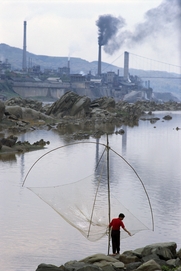While most people concerned with China’s pollution problem are focused on the smog-ridden skies, recent studies have found that focus should be drawn on a more important pollution problem in China – that found in the country’s waterways. According to 2,103 samples taken by the Ministry of Environmental Protection, over 80% of China’s underground water is unsafe for drinking because of pollution. Not only is this water used for human consumption, but it is also important for agriculture and industry. As of recently, China’s underground water use has increased, further exacerbating the problem. Currently, one-fifth of China’s total water demand comes from underground water, and in the arid-north, this statistic increases to two-thirds. Not only is China’s underground water supply severely polluted, but 70% of the country’s rivers have also been deemed unsafe for human contact.

China has a numeric system for grading water quality. Grades one, two, and three are safe for human contact, and four and five can only be used for industry and agriculture. Water that is grade five and above has essentially lost all functionality. The Ministry has stated that it plans to implement measures to improve the majority of water that falls on the unusable spectrum (five and above) by 2030.
What possible effects does this water pollution have on the Chinese economy? China’s water supply is currently one-third of the average per capita around the globe, meaning that a deterioration of the water quality could cause a bottleneck. This supply deficit could then hurt future economic growt h for the sectors that have the highest demand, such as agriculture, which currently uses 75% of the total water supply.
h for the sectors that have the highest demand, such as agriculture, which currently uses 75% of the total water supply.
The water pollution problem is currently in a cycle that is difficult to break. Agriculture and industry contribute heavily to the pollution in rivers and ground water. These sectors in turn suffer from the lack of clean water. The Ministry of Environmental Protection seems to be working to stop this cycle, but only time will tell if their efforts are successful.
Sources:
https://www.theguardian.com/environment/2016/apr/12/four-fifths-of-chinas-water-from-wells-unsafe-because-of-pollution
http://www.businessinsider.com/r-smog-may-be-easing-but-in-parts-of-china-water-quality-worsens-2016-11
http://www.dw.com/en/how-much-is-pollution-costing-chinas-economy/a-18323476
https://www.koshland-science-museum.org/water/html/en/Treatment/Agricultural-and-Industrial-Pollution-in-China.html
Based on previous posts about desertification in Northern China and this one on water pollution seem to indicate China is heading towards an environmental resource crisis. Problems like these are not easy to fix in a short time, and they will likely pose significant problems to Chinese society in the near future.
In a way this helps the water bottle industry. When clean water is not as accessible as it is in the States (except Flint, Michigan), people seem to cherish it more. At the Chinese 7-11, people preferred buying the more expensive water bottles over the cheaper ones in hopes of cleaner water. A brand like Fiji water would be a hot commodity in China. I found myself purchasing multiple gallon bottles due to how often I need to drink out of a water bottle, purchases I would never even think of making in the States.
This is by no means justifying the pollution of Chinese waters. I’m sure not even the people in Flint appreciate the fact that they cannot drink their own tap water. While the Beijing water is not dirty to this extent, some classmates still resorted to using bottled water to clean their cups and brush their teeth. People understand that the water is dirty and something needs to be done.
Austin, while I agree with you that demand for drinking water will increase, I think the main problem here is that industry and agriculture will face a water shortage crisis and they will not be willing to purchase clean, drinkable water to use for industrial purposes.
I am curious to know what the Ministry of Environmental Protection is actually doing to combat this problem. Does their statement of intent to reduce the amount of the worst water mean restrictions and regulations on the businesses that are causing the issue?
In the articles I read it seemed to suggest that the Ministry of Environmental Protection was being intentionally vague about their plans. They pledged to spend several billion dollars to aid the problem, but didn’t really outline where that money was going to be spent. Not surprised given the opaque nature of China’s governmental affairs.
It is interesting to read multiple posts about the difficult position China faces with their natural resources and current environmental makeup. As the country continues to expand rapidly, they will increasingly depend on these resources but if they are continually degrading, this issue may catch up the Chinese economy. With an issue such as water, China could face not only a growth crisis, but also a health crisis going forward; given the current state of their healthcare system, this would be a big issue for the greater populous.
Yes, I completely agree Peter. This is the issue I was trying to highlight in my post. This problem is particular seems to be a never ending cycle. A lack of water hurts industry and in turn the economy, but industry continues to contribute to this problem. I also think your point about a possible health crisis is forward-looking.
Clean water is an increasingly valuable world commodity. As fresh water becomes more scarce it creates a hot bed of potential conflict in the affected regions; this means even more for a country with a pollution problem like China.
This is a trend that is being noticed throughout the world, where even in European countries it is generally advised not to drink tap/fountain water. In Beijing, we can’t drink the tap water unless it is heated, and generally we are drinking bottled water. This issue falls under the overall pollution framework that is plaguing China.
Between this and the previous post on desertification, it would seem China has some real environmental problems that seem not to be on the forefront of most people’s minds. Basic high school economics suggest a lack of resources in your country severely hampers productivity. Based on some of our previous conversations about green energy, it would seem China is aware of this problem and trying to combat it. The question just becomes will it be too little to late?
This is extremely alarming. Not only does this affect industry, agriculture, and potentially the healthcare system, but with such polluted water the surrounding environment will begin to see degradation. Acid rain and increased nitrogen and phosphorus levels in the polluted water will begin creating environmental “dead zones” that lack oxygen necessary for life. This equally could spell disaster for China’s natural resources.
I agree with others that China seems to be headed toward environmental resource issues. Is the government doing anything to focus restrictions on the causes of pollution? You say that agricultural and industrial waste contribute heavily to groundwater pollution, but what, exactly, are these companies dumping which is so bad? Are there any laws in place to combat these, whether through cap-and-trade regulations or a simple Pigouvian tax?
It seems that China reformed its water pollution laws in 2008 as a response to this crisis. In regards to your question about what is causing the pollution, I think it’s a combination of lacking enforcement and rapid industrialization. According to one article (linked below), China is the largest consumer of synthetic nitrogen fertilizers, which is certainly not conducive to clean streams as China was a mostly-agrarian society until very recently.
Sources:
https://www.wilsoncenter.org/publication/quest-for-clean-water-chinas-newly-amended-water-pollution-control-law
https://www.koshland-science-museum.org/water/html/en/Treatment/Agricultural-and-Industrial-Pollution-in-China.html
I wonder how the government will address this issue as media attention intensifies. Their primary motivation in addressing air pollution seems to have been a combination of avoiding unrest among middle class urbanites and reducing international criticism. Will it take a similar outpouring of international media attention to open up domestic concerns about China’s water supply and, if so, is the government engaged in trying to suppress this issues already?
There is potential for a multitude of negative externalities from the lack of care being paid to the Chinese water supply, most of which have been mentioned above. Beyond the public health, agricultural and other constraints of a tainted water supply, there is also the potential for this crisis to take a bite out of China’s tourism industry if the pollution sufficiently harms China’s natural beauty.
In addition, while tourism is far from the most important industry in terms of driving China’s economy, if the country earns a reputation for destroying its natural sights, it could hurt the country’s soft power internationally.